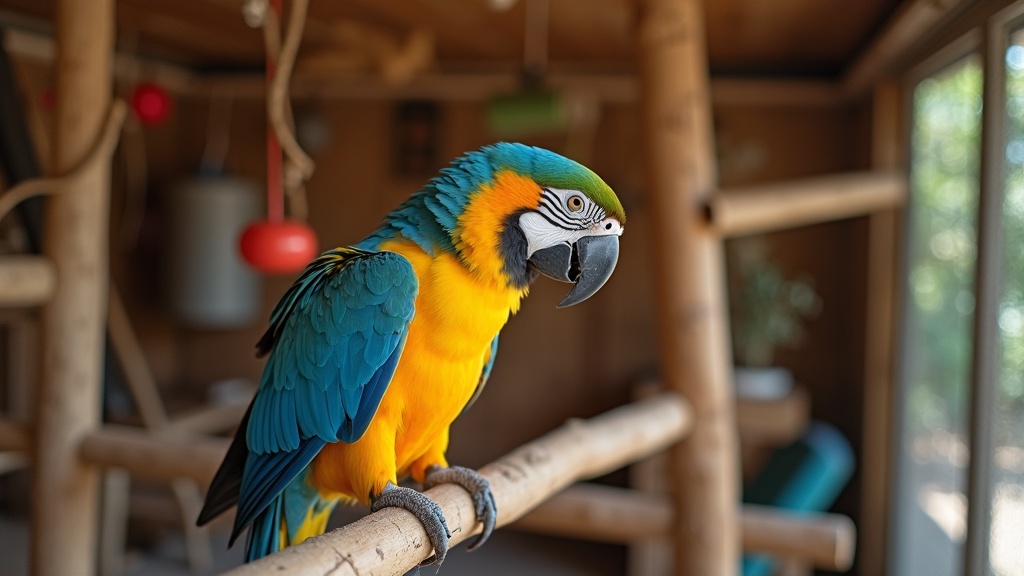Skipping a parrot’s initial socialization period can bring up way more issues than just a shy or nervous bird. There’s a wide range of behavioral problems that neurodivergent and neurotypical parrot guardians alike might have to figure out if that early bonding window is missed. In this article, I’m sharing insights from my own flock, practical advice, and a clear breakdown of why taking your time on those first interactions is really important for a happy, thriving parrot.

Understanding Foundations: Socialization and the Parrot Mind
Early socialization isn’t just a buzzword in the parrot community. It’s the process where your new feathered pal learns how to interpret human gestures, household routines, and even sounds. Think of it as the period where parrots, like many neurodivergent individuals, figure out what’s predictable and safe in their environment. Parrots that don’t experience these early positive interactions might grow up viewing humans as unpredictable or even scary, which can snowball into chronic stress and behavioral challenges.
Neurodiversity matters here too. Some parrots naturally have traits that echo neurodivergent ways of interacting with their world, showing hypersensitivity to sound, touch, or change. That’s kind of like some autistic or ADHD humans I know (and love). Recognizing all the different ways parrots process things can really help shape more supportive, flexible socialization strategies for birds with varying needs. Sometimes, a bird might be unexpectedly quick to spot subtle cues, while other times, they tune out the world in their own way. Creating a routine tailored to these differences sets a solid foundation for trust.
Why Initial Socialization Matters for Parrots
The first days and weeks shape much of a parrot’s trust and comfort level. If you’re like me and enjoy having a companion that’s genuinely relaxed around you, giving your bird early chances to see humans as friends (not threats) is super important. Missing out on this window doesn’t “doom” your parrot, but it does make building trust later a way longer process, sometimes even years, depending on the bird’s temperament.
- Stress Regulation: Socialized parrots manage stress and new experiences more smoothly. Birds who miss out may freeze up or react with panic over small changes.
- Bite Inhibition: Parrots taught gently during socialization learn to use their beaks with care. Birds that didn’t get this lesson may bite hard, not out of anger but confusion.
- Communication Skills: Early socialization helps parrots read human body language—and helps us read theirs. Without it, misunderstandings can lead to biting, lunging, or hiding.
- Developing Trust: New people, new toys, and novel foods don’t send them into full meltdown mode. Socialized birds are more curious, which helps their confidence too.
Lots of the parrot’s day-to-day happiness depends on their ability to trust you. A socialized bird usually finds it easier to unwind and try new things, which keeps everyone happier in the long run.
Common Behavioral Problems Linked to Missed Socialization
Every parrot is different, but there are a few behaviors I’ve seen pop up a lot more often in birds that didn’t get enough social exposure as chicks or right after coming home:
- Fear and Phobias: New objects, people, or even new foods can send them over the edge. Sensory-sensitive parrots may also experience overwhelming panic, not mild hesitation.
- Aggression: Sudden lunging, nipping, or even lunging at unfamiliar sights sound familiar? Missed socialization can lead to chronic feelings of threat, which shows up as “random” aggression.
- Chronic Screaming: Fearful birds often scream for reassurance or as a stress release, especially in unpredictable environments.
- Plucking and Self-Harm: Without safe relationships, parrots sometimes develop coping behaviors like feather plucking or self-biting.
- Rigid Routines: Parrots that never learned to roll with small changes may demand strict sameness, resisting any attempts at new enrichment or food. This inflexibility can also manifest in things like being particular about cage arrangement or refusing new toys altogether.
If your parrot shows some of these behaviors, it’s not about blame. It’s about understanding where things might’ve gone sideways, and how to gently help your bird move forward. It’s natural to feel frustrated at times, but know that supportive steps can always make things better for your companion.
Supportive Socialization for Parrot Types
Some parrots, much like neurodivergent humans, are hypersensitive or hypervigilant by nature. They might need an even slower, more thoughtful approach to socialization. In my experience, here are strategies that work well for these birds:
- Predictable Schedules: Sticking to a routine helps both you and your bird feel more in control. Feed, play, and interact at roughly the same times each day. Try using subtle cues, like a light being dimmed five minutes before bedtime, so your bird knows what’s coming next.
- Clear Body Language: Move slowly and avoid big, unpredictable gestures. Over time, your parrot will learn to attach meaning to your motions and expressions. For especially cautious birds, sometimes just sitting quietly in the room builds more trust than direct interaction.
- Gentle Exposure: Keep new experiences short and positive. Instead of forcing your bird to meet every guest, let them observe from a secure distance as you calmly interact with new people. If your parrot prefers background noise, try soft music or nature sounds to give them comfort.
- Choice and Consent: Whenever possible, give your parrot the option to walk (or fly) away from things that scare them. Reinforce every brave choice they make with praise or favorite treats. Respecting a bird’s “no” can be a powerful trust-builder.
These steps respect each bird’s unique neurology and create a safer, more rewarding home for both of you. For parrots that seem withdrawn or easily startled, a slower pace and more autonomy tend to bring out their courage over time.
Steps for Building (or Rebuilding) Trust in Missed-Socialization Parrots
- Start Where Your Parrot Is: Notice what settings, noises, and activities make your parrot tense, then set up quiet, non-threatening one-on-one time. Pay attention to body language, like eye pinning or feather fluffing, as early indicators of stress.
- Practice Positive Reinforcement: Use favorite foods, gentle words, and slow blinking to reward any tiny step toward interaction. Treats should be healthy and bite-sized, so training doesn’t impact their overall health.
- Normalize Short, Consistent Sessions: One minute of positive training is better than ten minutes of flooding your bird with attention or overstimulation. For birds prone to anxiety, quick, happy sessions work wonders and reduce pressure.
- Incorporate Sensory Supports: Some parrots, especially those with neurodivergent-style sensitivity, benefit from soft lighting, calm music, or predictable environmental cues while learning new skills. Experiment to see what helps your bird settle in.
- Celebrate Regressions as Part of Progress: Even if your bird slides backward after a setback, keep offering safe, positive experiences without pushing too hard. Progress isn’t always linear, and setbacks can help you learn what works best for your feathered friend.
This process can take weeks, months, or even years, depending on each parrot’s temperament and history. But I’ve seen plenty of nervous, undersocialized birds learn to love and trust again. Remember, every small win is worth celebrating.
Things to Consider Before Bringing a Parrot Home
Thinking about welcoming a new parrot, especially if you’re neurodivergent yourself or looking after a neurodivergent loved one? Here are some practical things worth considering:
- Time Commitment: Socializing a parrot, especially one with a rough start, takes a whole lot of patience, routine, and hands-on presence. Parrots can live for decades and need daily care.
- Sensory Environment: Parrots and neurodivergent humans can be super sensitive to light, noise, and movement. Set up calm, safe zones where the bird can decompress. Consider soundproofing part of a room or using blackout curtains for particularly skittish birds.
- Research Species Needs: Some parrots need more intense socialization or stimulation. Cockatoos and African greys, for example, usually need even more early bonding than others. Make sure to provide species-appropriate toys and activities.
- Access to Support: Find local or online communities for advice, problem-solving, and reassurance. Neurodivergent parrot guardians often have creative, empathy-driven solutions that neurotypical folks might not think of. Connecting with others can help tackle rough days and celebrate milestones.
Remember, no two parrots—or families—are the same. What works for one bird might not click for another, so flexibility is key to a well-adjusted home.
Socialization Challenges and Solutions
There’s no magic fix for an undersocialized parrot, but here’s what I’ve learned works pretty well for most birds:
- Patience and Consistency: Slow and steady always wins. Small wins build real trust, so keep routines consistent but allow for flexibility on tough days.
- Sensory Awareness: Watch for signs of overload, like shivering, freezing, or sudden screaming. Adjust your approach if your parrot seems overwhelmed. Offering a retreat spot (like a covered cage corner) can be grounding for birds who get anxious fast.
- Enrichment Variety: Try new toys, textures, and perches, but introduce them one at a time and always with treats and praise. Choice is powerful for birds! Rotating enrichment keeps things interesting without overwhelming your companion.
These ideas help create an environment where parrots and their guardians can learn together and grow in confidence and companionship over time. If you ever feel stuck, remember there are always new strategies to check out and experiment with—growth happens in stages.
Frequently Asked Questions
I get lots of questions from parrot families working through socialization challenges. Here are some helpful answers for some of the most common ones:
Question: Can you socialize an older parrot that missed its early window?
Answer: Absolutely, but it takes more time and extra patience. Older parrots can form deep trust when you let them move at their own pace and celebrate even small advances. Even if they seem set in their ways, many older parrots blossom with gentle, consistent care.
Question: Is there a difference in socializing neurodivergent parrots?
Answer: Yes! Some parrots are more sensitive to change, noise, and touch. Use a flexible, gentle approach and pay close attention to your bird’s body language to avoid overload. Routines and choice make a big difference. The more you tune in to your bird’s specific signals, the easier it is to build long-term trust.
Question: My parrot bites every time I try to interact. What should I do?
Answer: Take a step back and let your parrot approach you instead. Use positive reinforcement to reward calm behaviors, and keep your sessions short and upbeat. Biting usually signals fear or confusion, not stubbornness. Track your progress in a daily log to see which strategies work best over time.
Key Takeaways: Supporting Parrots for Lifelong Wellbeing
Giving a parrot a safe, social start—or helping them rebuild trust later on—lays the groundwork for a more harmonious home and better mental health for both bird and guardian. Staying mindful of each parrot’s neurotype, offering lots of choice, and using tiny positive steps every day makes a huge difference in preventing and correcting behavioral struggles. Nobody gets everything perfect, but with compassion and consistency, you’ll see your feathered friend grow into a calm, curious, and connected companion. When your parrot feels seen and understood, you both step up in awesome, heartfelt ways, deepening your bond as the years go by.
